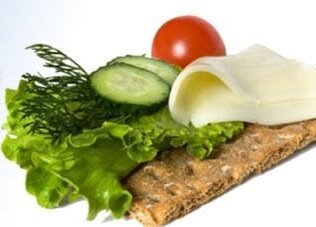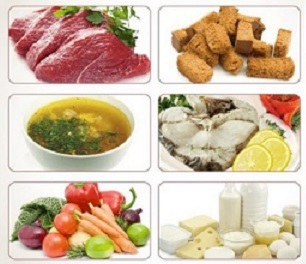The pancreas is an organ of the gastrointestinal tract that participates in endocrine (insulin) and exocrine (enzymes) secretions. Violation of the regime and the quality of nutrition causes irreversible damage to the functions of the pancreas, which is significantly reflected in the quality of its work. Therefore, you need to know what you cannot eat with pancreatitis to avoid inflammation of the organ.
What is pancreatitis and how dangerous is it?
Chronic pancreatitis with impaired enzyme function of the gland is a slow, chronic and progressive disease that manifests with abdominal pain, digestive disorders and nutrient absorption disorders.
Causes of the disease:
- Eating disorder;
- Eating fatty foods, as well as foods that should not be eaten with pancreatitis;
- Alcohol abuse;
- Eat a lot of sugar and flour products.
And also, other diseases of the gastrointestinal tract: peptic ulcer, gastritis, gastroduodenitis, cholecystitis, cholelithiasis.
A constant violation of the diet, as well as the use of heavy food for the stomach, leads to a violation of the secretion of enzymes by the pancreas. In the gland tissue, inflammation occurs, followed by hardening of the ducts. Over time, the body cannot make enough enzymes to digest food. All this affects the quality of digestion: undigested fibers appear in the feces, swelling develops in the intestines with fermentation processes, the absorption of necessary substances and vitamins is impaired.
Signs of exacerbation of chronic pancreatitis
Chronic pancreatitis symptoms:
- Herpes zoster on the abdomen;
- Nausea and vomiting;
- Weight loss;
- Stool disorder in the form of diarrhea or constipation.
In addition, pancreatitis can have such manifestations: general weakness, hiccups, swelling, dry skin, symptoms of vitamin deficiency.
Diet for pancreatic pancreatitis during an exacerbation

The main task of the diet in pancreatic pancreatitis is to develop a moderate diet and select a diet that reduces the load on the pancreas. Products that increase acidity in the stomach and stimulate the secretion of enzymes by the pancreas are excluded from the diet, so each patient should know what to eat in chronic pancreatitis.
In the period of exacerbation of chronic pancreatitis, complete hunger is prescribed for 2-3 days, until the symptoms disappear. During this period, you cannot eat food, even diet foods. The patient can drink if he has symptoms of thirst. The treatment is complemented with bed rest and complete rest. Cold in the abdomen.
A few days after the symptoms of the exacerbation of chronic pancreatitis have disappeared, food is given according to a specially developed diet. In medical practice, this is table number 5.
Food should be slightly warm. Avoid hot and cold food temperatures.
Cancellation of products
What should not be consumed in the diet for pancreatic pancreatitis:
- It is categorically contraindicated to eat fatty meats - pork, chicken skin;
- Strong broths (fish and meat) are excluded from the diet, as they have a sokogonny (fermentative) effect and will provoke pain in the stomach;
- Legumes and cabbage are not allowed; They are not only rich in coarse fiber, but will cause increased gas formation;
- Any carbonated drink;
- Smoked, fried or grilled foods;
- Coffee, strong tea, chocolate and cocoa products should be kept to a minimum;
- Turn off any kind of alcohol and fresh bread;
- Ice cream for pancreatitis should be limited;
- Exclude condiments: onions, garlic, peppers;
- Hard boiled eggs;
- Mushrooms in any form;
- Fatty varieties of fish are excluded: saury, mackerel, eel, saber fish, ivasi, Caspian sprat, silver carp, notottenia, sturgeon.
What should not be eaten with pancreatitis are sweets, cakes and sweet tea, since the high sugar content in the intestines causes fermentation and bloating.
In addition, with the exacerbation of pancreatitis, additional drug treatment is prescribed, which may include the following groups of drugs: proton pump inhibitors (reduce gastric secretion), enzymatic drugs, adsorbents, antispasmodics, analgesics.
Menu for exacerbation of pancreatitis of the pancreas
Diet development
The menu includes the following foods, the use of which provides the body with the necessary nutrients, but at the same time does not have an irritating effect on the pancreas. Food is steamed or boiled and should not contain raw vegetables or fruits.

Soups should be in water or low-fat meat (fish) broth. Best of all it is runny or rubbed. In no case should it be fried in soups. Porridge should be cooked in water or milk diluted in half with water.
The menu must include meat and fish. But not fatty varieties. The most dietary fish is cod, which has 1. 4% fat. This fish is quickly digested in the gastrointestinal tract and is easily digested. It does not strongly stimulate the enzymatic function of the pancreas, which is why it is considered optimal for pancreatitis.
For meat, preference is given to rabbit, turkey, beef tenderloin or chicken breast. Steamed, baked with vegetables or boiled meat products. You can cook meatballs or cutlets from half a vegetable.
The menu includes the following foods:
- steamed, boiled or stewed vegetables;
- yesterday's bread;
- baked fruits (apples);
- low-fat lactic acid foods;
- drinks: compote, gelatin, soft tea;
- lean meats - chicken breast, turkey, beef and veal sirloin, rabbit;
- low-fat sea fish: pollock, blue whiting, hake, flounder, cockroach, cod;
- Lean river fish: sea bream, perch, pike, walleye, crucian carp, tench.
The last meal should be no later than 2-3 hours before bedtime. For a bedtime snack, biscuits and compotes or gelatin are preferred.
Menu layout
Sample menu for a day with chronic pancreatitis. Products that cannot be eaten with pancreatic disease are turned off and a diet is selected that is as gentle as possible on the body.
- Breakfast:steamed omelette, porridge boiled in milk (buckwheat, rice or other), half and half with water and mild tea. Option: semolina porridge without oil, dried fruit compote with sponge cakes;
- Second breakfast (lunch):low-fat cottage cheese about 100 gr, gelatin or compote. Option: baked apple casserole or cottage cheese;
- Lunch:vegetarian soup, boiled chicken breast, and dried fruit compote. Option: no-fry soup, steamed meatloaf, rosehip broth;
- Snack:baked apples or crackers with rosehip decoction. Option: a glass of low-fat kefir;
- Dinner:Vegetable puree (potatoes, zucchini, carrots), steamed cutlets, herbal tea. Option: porridge in milk, boiled chicken breast, gelatin;
- Snack:a glass of low-fat kefir or fermented baked milk or fruit jelly. Option: rosehip decoction.
When asked if ice cream can be used for pancreatitis, the answer can be given to this, they limit the use of fatty and very sweet ice cream. You can include only ice cream in the diet, no more than ½ packet and no additions (chocolate, nuts, condensed milk).
Patient note

Every patient should know the rules of feeding and what not to eat with pancreatitis.
Consider the recommendations:
- Meals should be divided, that is, in small portions up to 5-6 times a day;
- They adhere to the diet for at least half a year, although ultimately the patient must adhere to the diet for their entire life;
- Food should be high in calories, depending on need;
- Do not eat foods from the above list that you should not eat in case of pancreatic disease;
- Overeating is not allowed;
- Is it possible with ice cream from pancreatitis? Limited use of low-fat ice cream.
In addition, prompt treatment of any disease of the gastrointestinal tract is necessary to prevent complications and reduce the number of exacerbations of the disease.




























